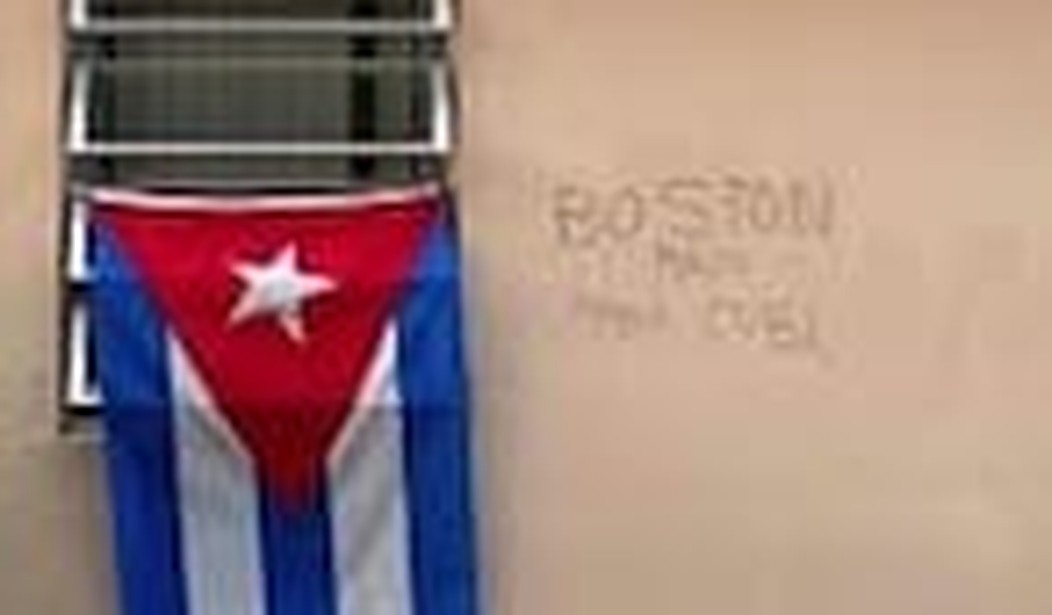This election cycle was remarkable in the degree to which we were subjected to analysis of the polls. In particular, conservatives like me believed the pollsters had it wrong when they showed a likely voter mix that resembled 2008. We were wrong; the pollsters were largely right. The Democrats turned out in enough numbers to negate the advantage Romney had with independents.
In the immediate aftermath of Mitt Romney’s defeat, an unprecedented amount of scrutiny was focused on the Cuban-American population of south Florida. Some exit polls claimed Romney lost the historically reliable Cuban vote for the GOP, and others showed a small margin in favor of Romney.
The Cuban-American vote is important because it has been a Republican island in the sea of blue that is the map of south Florida. In fact, it has been important enough to perhaps swing an entire presidential election. Many observers believe an angry Cuban-American bloc turned against Vice President Al Gore because of President Clinton’s handling of the Elian Gonzalez case. George W. Bush won Florida by only 537 votes, and exit polls show Gore did worse with Cuban-Americans in 2000 than Clinton did in 1996. It’s not a stretch to think that at least 269 Cubans registered a protest vote in favor of Bush or voted for Bush but wouldn’t have voted at all if not for Elian.
Despite a Republican-dominated state legislature and a Republican governor, the state has gone for Obama twice, though the spread in 2012 contracted to .9% from 2.5% in 2008. So as we look forward, we can see that Cuban-Americans may once again have a disproportionate influence in choosing a president in 2016.
The exit polls showing a close contest between Obama and Romney among Cuban-Americans are in contrast to polls immediately before the election that showed the Cuban vote was firmly in Romney’s camp. Professor Eduardo Gamarra of Florida International University fielded one such poll, and had this to say of his findings:
“You keep hearing about a liberalization of the vote with younger, second-generation Cubans. But the polls are not showing it,” Gamarra said. “Young Cubans are starting to look more Republican than their parents.”
So when the question of who won the Cuban vote in 2012 arises, which poll are we to believe? There’s an old saw that says the only important poll is the one taken on Election Day, so I’ve gone to the actual election results at the precinct level to see which polls were closer to the truth. There’s quite a bit of extrapolating that has to be done, but I think you’ll see it’s pretty straightforward.
The Census Bureau reports Hispanic population at the zip code level (actually zip code Tabulation Areas). They also offer granularity about Hispanics in measured areas such as, in this case, the percent of the population who are Cuban in background. So I proceeded to find the top ten proportionately Cuban zip codes in Miami-Dade County according to the Census. The logic is that the closer to 100% Cubans represent in an area, the more pure of a read we’ll get as to how Cubans voted.
I then obtained a list of Miami-Dade County’s precincts from the Elections Department and isolated the ones located in the 10 Cuban zip codes; there are 111 of them.
When aggregated, Mitt Romney won these 111 precincts 58.5% to 41%. This is in a county Obama won 67.6% to 37.9%.
According to the Census, the population of these 10 zip codes is 92% Hispanic and 70.4% Cuban Hispanics. It can be easily argued that non-Cuban Hispanics brought down Mitt Romney’s numbers in these precincts, since non-Cubans statewide (and nationwide for that matter) went for Obama in a big way. We can deduce therefore that 58.5% is a floor or the minimum amount of support that Romney got from Cubans in these zip codes.
Note that there are precincts in Miami-Dade (with significant numbers of registered voters), such as precinct 390 in the very Cuban Miami Lakes area, that went as high as 74% voting for Romney. Without doing an extraordinary amount of math, one can see that true Cuban support for Romney probably was somewhere in the mid to low 60s, a clear win for the Republican but somewhat less than other GOP candidates in the past. I did a similar analysis four years ago and estimated McCain’s support to be just shy of 70% among Cuban-Americans.
Then there’s the work of real political scientists like Dr. Dario Moreno and Dr. Kevin Hill of Florida International University. They conducted “an ecological regression of large Cuban precincts in Miami-Dade County and found that the Cuban-Americans voted for Romney 58% to 42%. This is very close to my “floor” for Romney.
So the news appears mixed. Clearly Romney won among Cuban-Americans, but apparently with a less dominating margin than previous GOP candidates. The deterioration of support probably wasn’t enough to make a difference in Florida, but should be troubling to the Republican Party.
Romney campaigned hard in south Florida, but I don’t think he ever connected well with many Cuban voters. In 2007 he made an embarrassing gaffe while addressing Cuban-Americans, inadvertently using a communist slogan favored by Fidel. Romney’s running mate, Paul Ryan, was also once opposed to the embargo based on a libertarian argument that free trade frees people (an argument that Cubans might agree with, except for the fact that they know trade with Cuba is not free since the government dominates 90% of the economy in that country). Add Romney’s ground game troubles, and perhaps we can explain some of the fall-off.
Can Florida Cubans return to previous levels of support for GOP presidential candidates? I think so, particularly if Marco Rubio is at the top of ticket. In the same 111 precincts in which Romney obtained 58.5% of the vote, Rubio got 65% in his 2010 Senate run.









Join the conversation as a VIP Member